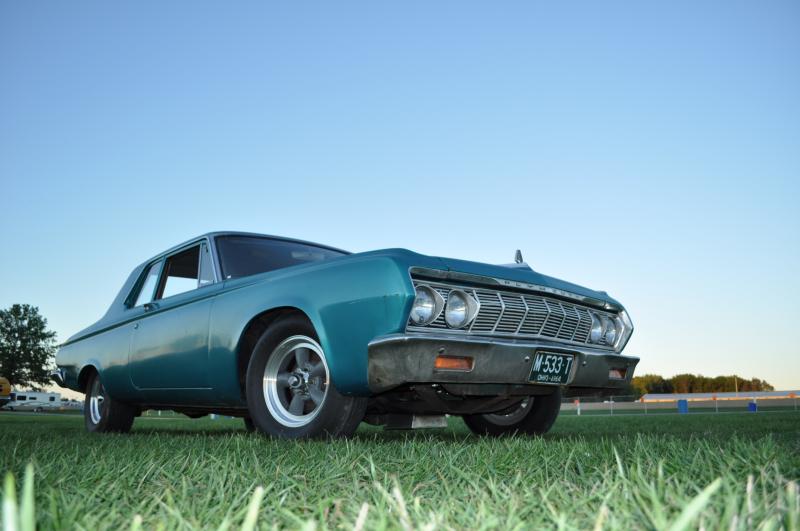Posted By: weedburner
Making radials + clutch slip easier to understand? - 08/03/15 10:00 PM
I put this short article together to help illustrate benefits of controlled clutch slip. It's a work in progress, I hope it gives those manual trans guys who are "radial curious" a little re-assurance that the more efficient radials can be a viable choice. I know many here make more power than this example, but this stuff generally scales nicely as long as there is enough clutch capacity to match engine output.
How is it possible that a car can be quicker while “wasting” energy slipping the clutch? Truth is simply that an engine can burn more fuel spinning at a higher rpm. This makes it possible to produce a surplus of energy, beyond that which is absorbed as heat in the clutch assembly. Net result being MORE power applied to the track, not less. Same reason it’s possible for an automatic car to be quicker in spite of installing a looser converter that produces more slip, it’s all about producing energy faster than you are “wasting” it.
To illustrate, here's some feedback on my ClutchTamer from an east coast NMRA Factory Stock racer. Powered by a 302ci crate engine, stick cars like his are required to run a diaphragm clutch. This guy was having a rough time, as he was a slick racer switching to radials. With a typical 4300 launch, the radials bogged the engine to 2300rpm and 1.7x 60's. Stepping up to a 4800rpm launch in an attempt to eliminate the bog, this is what happened to his faceplated TKO...
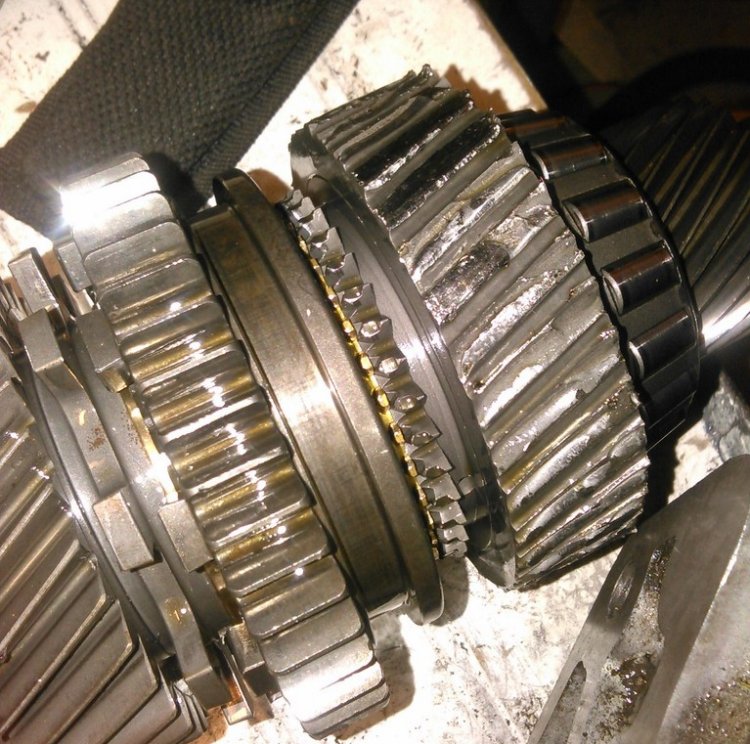
He repaired the transmission, and I sent him an in-dash version of the ClutchTamer to try. He installed the ClutchTamer, made a few test hits in the driveway to get familiar with it, then went to the track. His immediate results were dead hooked radials and back to back 1.45 60's. This graph is from a 1.42 run...
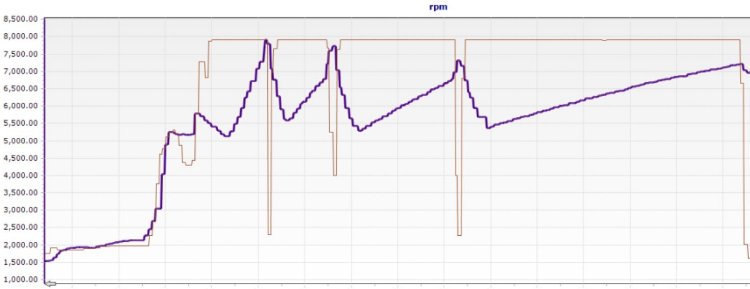
Couple months later, he’s still putting down 1.4 60's at class weight with no transmission failures from 5200rpm launches. This increase in durability is due to two things-
1- a reduction of engine rpm loss before clutch lockup
2- spreading rpm loss over a longer time period
Both are beneficial on launch as well as after the shifts, as they team up to reduce shock to the drive train and tires.
Here's the same graph w/ a couple lines added to help illustrate those benefits. His graph is fairly easy to understand, as there is very little wheelspin to confuse things...
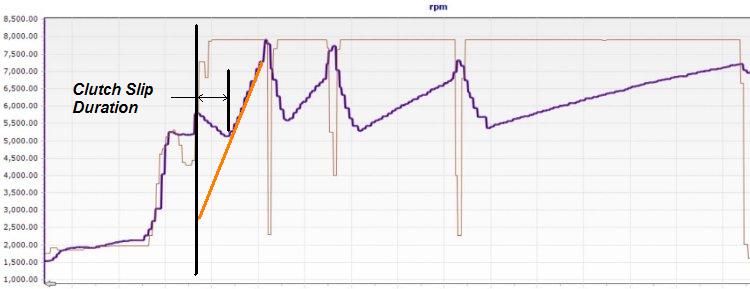
The added orange line is a rough representation of the engine's ability to gain rpm in 1st gear.
The 1st added vertical black line represents the launch, or beginning of clutch engagement.
The 2nd added vertical black line represents the point of clutch lockup.
The distance between the two vertical black lines represents the time it took for clutch lockup to occur.
Clutch slip duration was roughly .7 seconds, engine rpm at lockup was about 5100.
…If clutch lockup had occurred at .4 seconds, engine rpm would have been pulled down to appx 4200 on the orange line.
…If clutch lockup had occurred at .25 seconds, engine rpm would have been pulled down to appx 3500 on the orange line.
This is a bit of a simplified explanation. Reduced engine output at lower rpms would also reduce the engine's ability to gain rpm, that added power loss is not reflected here. The basic point is- the earlier clutch lockup occurs, the lower the rpm point on the orange line that the engine will have to accelerate from.
Anyone wonder why that orange line on the graph aligns with 2700rpm at launch instead of zero rpm? It's because a line representing rate of acceleration is actually even steeper before the clutch locks up. This happened because no power was used to accelerate the rotating assembly prior to clutch lockup, so more power was available to accelerate the car. Here's the same graph, with a red line added to represent acceleration rate before clutch lockup...
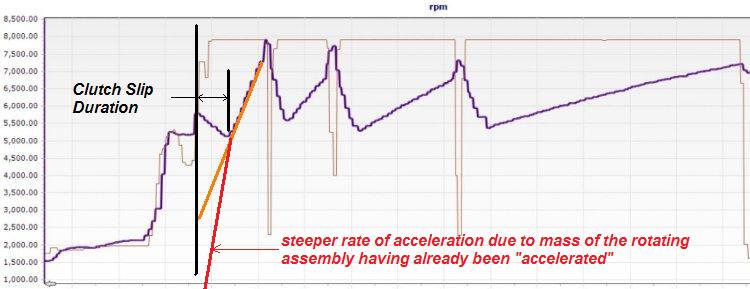
See how much steeper the car's acceleration rate was before clutch lockup?
This launch could have reached it's shift point even quicker if the clutch had slipped longer, as the car would have rode the trajectory of that steep red line to a higher point before switching to angle of the orange line. Same logic applies to clutch slip after the shifts, a car can simply accelerate quicker before the clutch locks up. Generally the longer you delay clutch lockup, the longer you ride a steeper acceleration rate.
The lightest clutch assy may not necessarily be the quickest when it comes to exploiting clutch slip, as the clutch needs to have enough thermal capacity to absorb the slip without overheating/warping. Having plenty of clutch capacity for the task is the 1st requirement, then it's a matter of controlling the application of clutch pressure to match engine power.
Just trying to make this subject easier to understand. Any feedback you might have, good or bad, would be greatly appreciated.
How is it possible that a car can be quicker while “wasting” energy slipping the clutch? Truth is simply that an engine can burn more fuel spinning at a higher rpm. This makes it possible to produce a surplus of energy, beyond that which is absorbed as heat in the clutch assembly. Net result being MORE power applied to the track, not less. Same reason it’s possible for an automatic car to be quicker in spite of installing a looser converter that produces more slip, it’s all about producing energy faster than you are “wasting” it.
To illustrate, here's some feedback on my ClutchTamer from an east coast NMRA Factory Stock racer. Powered by a 302ci crate engine, stick cars like his are required to run a diaphragm clutch. This guy was having a rough time, as he was a slick racer switching to radials. With a typical 4300 launch, the radials bogged the engine to 2300rpm and 1.7x 60's. Stepping up to a 4800rpm launch in an attempt to eliminate the bog, this is what happened to his faceplated TKO...


He repaired the transmission, and I sent him an in-dash version of the ClutchTamer to try. He installed the ClutchTamer, made a few test hits in the driveway to get familiar with it, then went to the track. His immediate results were dead hooked radials and back to back 1.45 60's. This graph is from a 1.42 run...


Couple months later, he’s still putting down 1.4 60's at class weight with no transmission failures from 5200rpm launches. This increase in durability is due to two things-
1- a reduction of engine rpm loss before clutch lockup
2- spreading rpm loss over a longer time period
Both are beneficial on launch as well as after the shifts, as they team up to reduce shock to the drive train and tires.
Here's the same graph w/ a couple lines added to help illustrate those benefits. His graph is fairly easy to understand, as there is very little wheelspin to confuse things...


The added orange line is a rough representation of the engine's ability to gain rpm in 1st gear.
The 1st added vertical black line represents the launch, or beginning of clutch engagement.
The 2nd added vertical black line represents the point of clutch lockup.
The distance between the two vertical black lines represents the time it took for clutch lockup to occur.
Clutch slip duration was roughly .7 seconds, engine rpm at lockup was about 5100.
…If clutch lockup had occurred at .4 seconds, engine rpm would have been pulled down to appx 4200 on the orange line.
…If clutch lockup had occurred at .25 seconds, engine rpm would have been pulled down to appx 3500 on the orange line.
This is a bit of a simplified explanation. Reduced engine output at lower rpms would also reduce the engine's ability to gain rpm, that added power loss is not reflected here. The basic point is- the earlier clutch lockup occurs, the lower the rpm point on the orange line that the engine will have to accelerate from.
Anyone wonder why that orange line on the graph aligns with 2700rpm at launch instead of zero rpm? It's because a line representing rate of acceleration is actually even steeper before the clutch locks up. This happened because no power was used to accelerate the rotating assembly prior to clutch lockup, so more power was available to accelerate the car. Here's the same graph, with a red line added to represent acceleration rate before clutch lockup...


See how much steeper the car's acceleration rate was before clutch lockup?
This launch could have reached it's shift point even quicker if the clutch had slipped longer, as the car would have rode the trajectory of that steep red line to a higher point before switching to angle of the orange line. Same logic applies to clutch slip after the shifts, a car can simply accelerate quicker before the clutch locks up. Generally the longer you delay clutch lockup, the longer you ride a steeper acceleration rate.
The lightest clutch assy may not necessarily be the quickest when it comes to exploiting clutch slip, as the clutch needs to have enough thermal capacity to absorb the slip without overheating/warping. Having plenty of clutch capacity for the task is the 1st requirement, then it's a matter of controlling the application of clutch pressure to match engine power.
Just trying to make this subject easier to understand. Any feedback you might have, good or bad, would be greatly appreciated.
